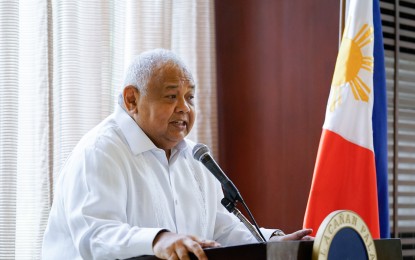
Executive Secretary Salvador C. Medialdea (PNA File photo)
MANILA – As the Philippine government’s commitment to protecting its people under extreme circumstances have been put to the test by the coronavirus disease 2019 (Covid-19) pandemic, a Palace official assured Wednesday that the whole-of-government response is in “strict accord with human rights standards “.
“These human rights standards were observed in identifying and prioritizing beneficiaries, guaranteeing equal treatment in the enforcement of rules and regulations, demanding accountability and transparency from government institutions and their workers, and ensuring the protection of workers at the frontlines,” Executive Secretary Salvador C. Medialdea said in his message in time for the observance of International Human Rights Day and 72nd anniversary of the Universal Declaration of Human Rights on December 10.
The movement of people, Medialdea said, was contained in accordance with relevant domestic laws and policies on quarantine, disaster risk reduction, and infectious disease control; and international standards on civil and political rights protection, and healthcare management.
Reducing the impact of the pandemic on Filipinos are two measures – Republic Act (RA) No. 11469 also known as the Bayanihan to Heal as One Act enacted in March 2020, and RA No. 11494 or the Bayanihan to Recover as One Act also known as Bayanihan 2 signed on September 11, 2020
“Social amelioration programs and humanitarian assistance have characterized our support for marginalized groups, including indigent children and older persons, and families of overseas workers who were rendered out-of-work and are awaiting repatriation,” he said.
Medialdea also cited the Philippine government’s National Action Plan (NAP), which aims to adopt measures for containment and mitigation of the spread of the virus to reduce the spread of new cases and to facilitate the detection, identification, and isolation of Covid-19 carriers.
The NAP for Covid-19, he said, has spurred the government's efforts to render the country's healthcare system more responsive to the myriad pandemic concerns.
“Efforts in this regard have resulted in better resilience, prevention of transmission through reduced contacts, shortened infection periods of individuals, and the setting in place of accessible quality hospital and healthcare services,” he added.
While the whole country struggles under the new normal, he said “infrastructure and social development programs that bear upon food supply chains and which extend temporary relief to many are continuously being pursued.”
In keeping with the theme “Recover Better – Stand Up for Human Rights” for this year's observance of International Human Rights Day, he said the Philippine government has remained focused on accelerating the country's economic recovery while protecting public health.
“These human rights-compliant efforts of the Philippine government will allow our country and our people to recover from the pandemic better, stronger, and with greater resolve to move forward,” Medialdea said. (PNA)
